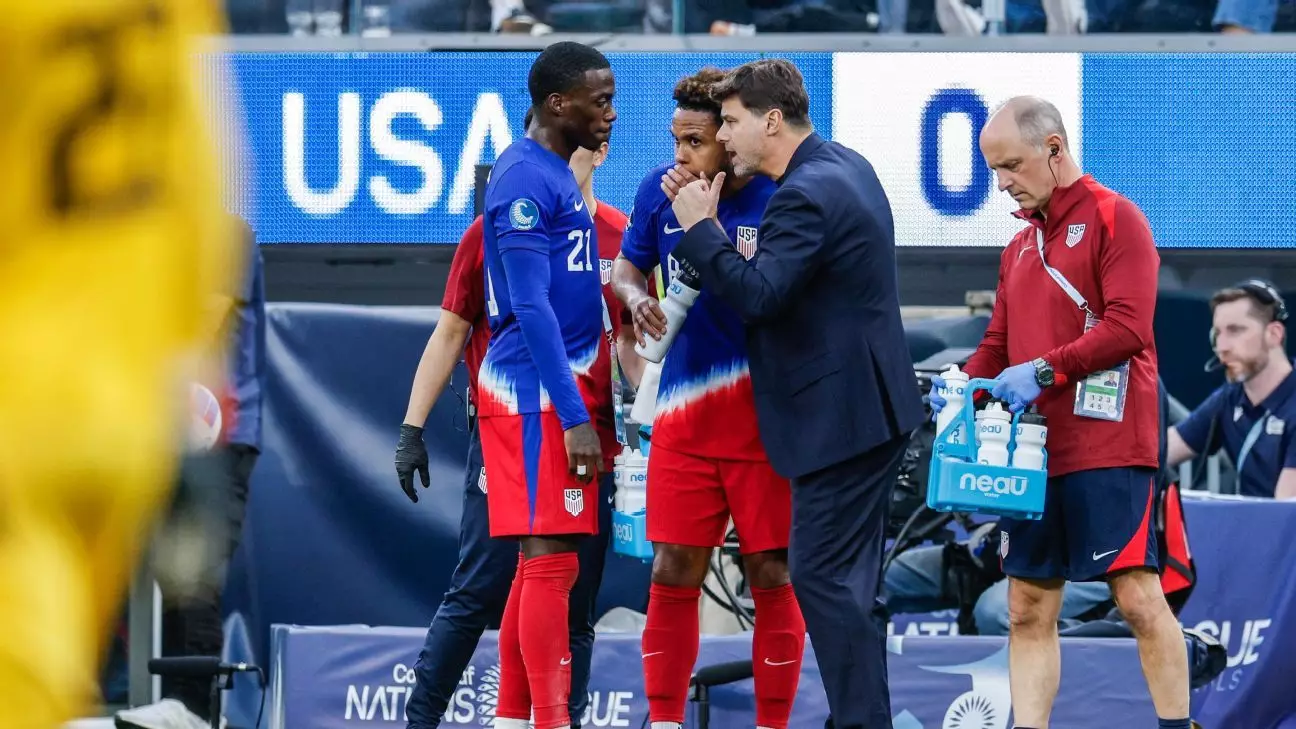When a manager like Mauricio Pochettino expresses frustration following a defeat, it is vital to tune in and listen. Following the U.S. men’s national team’s agonizing 1-0 loss to Panama in the Concacaf Nations League semifinals, Pochettino didn’t sugarcoat the reality as he deconstructed the match for the press. His comments, filled with disappointment, highlighted a stark truth: talent alone cannot win games. The emotional weight behind his words exposes a deeper issue within U.S. soccer. This isn’t merely about the defeat; it speaks volumes about a culture of complacency that continues to plague the team.
In soccer, where the competition is fierce and unpredictable, it is insufficient for athletes to merely wear the kit of a national team. Competing at that level requires tenacity and a willingness to struggle for every single advantage. Pochettino’s assertions reflect a growing anxiety in U.S. soccer circles: Can this team evolve from a group of talented players to true competitors on the international stage?
The Illusion of Dominance
Possession statistics from the match painted a tantalizing picture. The United States controlled 66% of the ball, a clear indication that they dominated the field temporarily. However, those numbers are mere window dressing if they don’t translate into tangible scoring opportunities. The xG (expected goals) of 0.68 signifies that while the U.S. was on the ball, they were neither dangerous nor effective. On the other hand, Panama’s 0.10 xG underscored a pragmatic approach that ultimately brought them triumph. This stark juxtaposition between perceived control and actual effectiveness underlines a disheartening reality: Statistics can often mislead one’s interpretation of a match.
What is alarming is how the U.S. seemed to settle into a groove of safe play, moving the ball with the intent but without urgency. It’s as if they were lulled into a false sense of security, believing that holding possession would somehow guarantee a win. This phenomenon is not new; akin to a bad habit, it appears to have embedded itself within the fabric of American soccer.
High-Stakes Decisions and Tactical Missteps
The timeline of events in this match points to tactical miscalculations that ultimately proved costly. Pochettino’s conservative approach to substitutions, particularly refraining from introducing creative players like Giovanni Reyna until it was too late, raises eyebrows. In high-stakes matches, failure to adapt and take risks can be catastrophic. With minutes left on the clock, why not gamble on creativity? His hesitation to make bold moves may show a lack of faith in the players—or worse, an adherence to a rigid strategy that refuses to bend to the realities of the game.
Pochettino’s remarks about wanting to save creative talent for a potential extra time may be rooted in caution, but they signal a mindset that is ill-suited for modern football. The time for caution was before the match; once you are in the trenches, one must act decisively. This reluctance can erode players’ confidence, leaving them questioning their own capabilities. Will they ever truly challenge for the win if they are not pushed to embrace their creativity in critical moments?
Next Steps: A Call for a Mental Shift
Relay this message to the players: If they want to change the narrative, a carpe diem mindset must emerge. After the soul-crushing defeat, the U.S. must rally, not only for the upcoming third-place game against Canada but also for the future of the program. They must embrace aggression and push the boundaries of their comfort zone. If players can imbibe this philosophy, they have the potential to transform into a squad that can truly commit to the fight and not merely count on possession statistics.
Pochettino’s frustrations starkly illuminate that it is not enough for players to don the national team crest. They must earn the respect that comes with it through grit, creativity, and above all, a commitment to compete tooth and nail. If they can adopt this raw mentality, it could mark the beginning of a new chapter in U.S. soccer that fans have long yearned for. But for now, they stand at a crossroads, staring into the depths of what could have been.


Leave a Reply